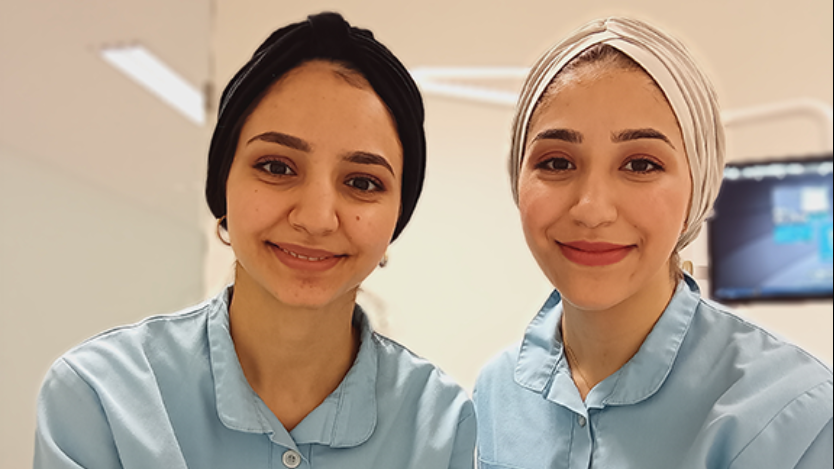
Sham and Amirah Aldagistani, two Syrian sisters, recently finished a chapter that began in their homeland: the Integrated Master in Dentistry. Their training was interrupted by the war, but thanks to a scholarship awarded by the Universidade Católica Portuguesa, they were able to resume and complete their studies at the Faculty of Dental Medicine at the Universidade Católica in Viseu.
The future dentists describe their time at the Regional Center of Viseu as "the most important thing that happened" in their lives. "Moving to Portugal was an experience that made me much stronger, more confident. I learned a lot," shares Sham.
Learning was done by overcoming various obstacles, and a strong support network. It was only when they arrived in Portugal that they had their first contact with the Portuguese language, something that Sham confesses was a "great challenge", which they eventually overcame. "Yesterday I did my thesis defense and I wasn't nervous, because after my first year in Portugal, nothing is too hard anymore."
The people they met, their classmates, professors, and the staff at the School of Dental Medicine helped the sisters overcome the difficulties of integrating into a country with "a very different culture." Sham and Amirah fondly remember the support of Professor Filomena Capucho, responsible for international relations. "She helped us a lot because she knew the difficulties we were going to have, she knew that our integration was going to be different from the students who come from Europe," explains Sham.
Along with everyone who reached out to them, Amirah believes that having her sister close by was one of the most important things of this experience. Although they are different ages, they stayed in the same class. "It helped a lot that we were always together. We were supportive of each other."
Grateful for the opportunity that Universidade Católica has provided them, the sisters see the granting of scholarships to refugees as "very important initiatives." "This opportunity doesn't just help one person. It helps many people survive in the most difficult situations. It helps families and communities," Sham explains.
Amirah and Sham hope that the scholarship program can open the door for "refugees who were not lucky enough to complete their studies" in their country and thereby "improve their future." With this experience, they will forever take with them a part of Portugal, and of Viseu, where they dream of staying to practice dentistry, and where they have left their mark on the community.
"I think our colleagues also learned a lot with our presence, it was a wealth for both parties," comment the future dentists. Fans of Portuguese cuisine, Amirah confesses that she already knows how to "make octopus à lagareiro and cod with cream", typical Portuguese dishes. "Now, I think I'm a mixture of Portuguese and Syrian culture, it's very beautiful."


